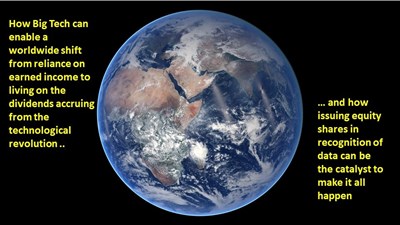For adults, egalitarian capitalism means a programme of determined capital participation. Some may claim that the term ‘egalitarian’ does not correspond with the basic tenets of capitalism: but that only serves to explain the problem with the traditional view. Margaret Thatcher may have labeled it as ‘popular’ in the 1980s, but unless all can share in wealth creation it will always be seen as elitist.
The ingredients for this capital participation for all certainly include:
- a new drive for personal share ownership, in order to re-connect people with business, a substantial increase in voting, and fiscal encouragement for investment clubs, recognising their ability to build confidence in risk assessment and knowledge of investment – this to include new issue participation and a close look at the operation of pre-emption rights; and
- re-balancing the scales between private equity and public markets, to include looking at the treatment of interest, stamp duty, the burden of regulation, and the bias towards business trade sales as opposed to retail flotations; and
— but these will only shift the dial slightly: it is the technological revolution which gives us a real opportunity to move swiftly into widespread capital participation, introducing a new programme so that data storage and harvesting by tech giants are recognised in share ownership for their customers.
The tech giants’ concentration of wealth is staggering, and hardly a day passes without some report of the deployment of excessive wealth concentration in vanity projects.
To quote Yanis Varoufakis: ‘Our creations - the machines installed in every factory, field, office and shop - have helped produce a great many products and have changed our lives utterly, but they have not eradicated poverty, hunger, inequality, chores or the anxiety about our future basic needs’.
There is also a fundamental economic instability in this process, because machines, unlike human labour, don’t spend money. Rather, they hoover up the money circulating in the economic system at large, and they deposit it at the disposal of their super-rich masters, instead of letting employees’ weekly expenditure fuel the income for others throughout society.
Some economists have tried to address this by proposing a ‘Universal Basic Income’, but this is surely looking for the lowest common denominator, or ‘levelling-down’: a route by which the vast majority of humanity will be left on subsistence terms.
 The answer lies in democratising the equity ownership of the tech giants - and, because their masters are unlikely to enable this voluntarily, governments need to set the criteria by which this is to be achieved. For, if the majority of humanity - who almost all use the services of big tech – were to see their working wages gradually being replaced by regular dividends from that equity ownership, we will achieve a society in which all can benefit from the massive boost in experiential wealth which automation is bringing about.
The answer lies in democratising the equity ownership of the tech giants - and, because their masters are unlikely to enable this voluntarily, governments need to set the criteria by which this is to be achieved. For, if the majority of humanity - who almost all use the services of big tech – were to see their working wages gradually being replaced by regular dividends from that equity ownership, we will achieve a society in which all can benefit from the massive boost in experiential wealth which automation is bringing about.
So, we should use big tech’s huge storage and harvesting of our personal data as the currency for distribution of their equity shares to their customers. We’re all aware that the tech giants sit on an immense store of data about us; GDPR has done almost nothing to rein in their intrusion into our personal lives.
Data harvesting is the major element contributing to the market capitalisations of the tech giants, as evidenced in stock market movements impacting Facebook/Meta during winter 2021/22.
'Stock for Data' will additionally achieve two great benefits: firstly, that there will be democratic control over the way their governance (including that check on anti-trust behaviour) and secondly, that the flow of dividends will over a period of time replace the huge quantity of lost money that automation is gradually sucking out of circulation.
It's important to note that this proposition will need international adoption, so that the resultant equity ownership will reflect the global customer base serviced by the tech giants.

